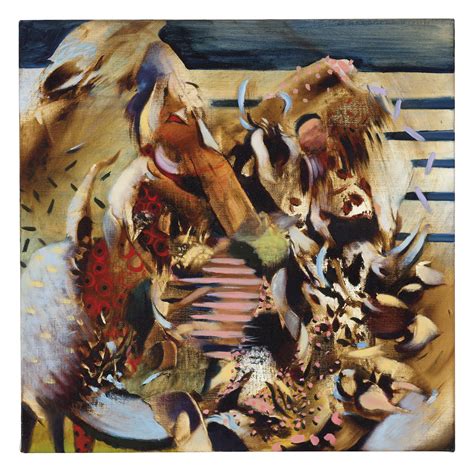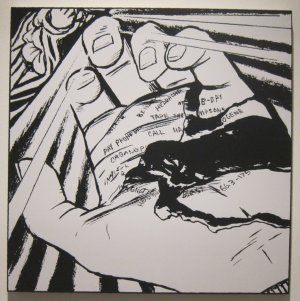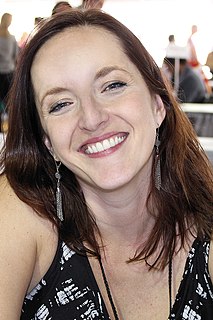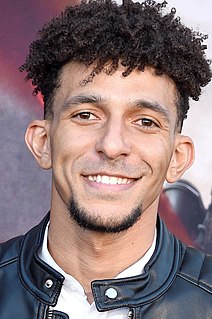A Quote by Ali Banisadr
Think about the way you go surfing on the Internet - you go from one thing to another. You can't really concentrate. I can't sit and read 10 pages on my computer. You'll read and then all of a sudden part of your brain is like, "What about that? ...You're not reading the whole book. You're reading fragments. Even though I think it's bad, I think it's interesting too, because that's the way my brain works.
Related Quotes
I read continually and don't understand writers who say they don't read while working on a book. For a start, a book takes me about two years to write, so there's no way I am depriving myself of reading during that time. Another thing is that reading other writers is continually inspiring - reading great writers reminds you how hard you have to work.
For most people, what is so painful about reading is that you read something and you don't have anybody to share it with. In part what the book club opens up is that people can read a book and then have someone else to talk about it with. Then they see that a book can lead to the pleasure of conversation, that the solitary act of reading can actually be a part of the path to communion and community.
There’s different ways to be impacted by truth. One is to read the scriptures. Another is to read other works by other people who have read the scriptures, non fiction for example. Another is to do studies. Another is to go to a place of worship. Another thing is to sit and listen to someone who’s speaking. There’s all kinds of ways. Another way is to write. About the truth. Discover the struggle through your character.
A writer writes a book. People read it. You don't know what they're reading, really. You read a review and think, "That is so inaccurate. You can't have been reading my book with any kind of attention, because that is all wrong, that's even the wrong name you're including there." But these reviewers have been diminished in importance, the work is so little respected. If you're reviewed by a real critic, by James Wood or Louis Menand, then you get something that is informed, interesting, and highly articulate. But the average review doesn't have that kind of depth anymore.
For me, I was in school and I pushed myself to be a good student, just because that's the type of person I was, but I never had a connection to any of it. I don't think my brain functioned in a way that was at its height, when I was in school. I needed something like art to really value the way my mind works. I wasn't reaching my full potential by sitting in a classroom and reading from a book. My mind didn't work that way.
I suppose I could read more fiction, but I haven't moved in that direction. I'd like more time even though I spend six hours a day reading. People say their eyes get tired, but I've never experienced that. In college I used to read 10 hours a day. My wife says I'm obsessive compulsive. She might have a point because when I was an undergrad student we had the required reading list and the suggested reading list. I always read all the suggested reading too.
One thing I noticed over time is that if I got a bad review, usually the bad part of it was at the very end. I could tell that nobody read the whole review because they would just say, "It was great to see the review!" In a way, my brain shuts down at the end of an article. It doesn't really want to go to the end.
I think too much is known about me already. I think biographical information can get in the way of the reading experience. The interchange between the reader and the work. For example, I know far too much about Norman Mailer and Kurt Vonnegut. Because I know as much as I do about their personal lives, I can't read their work without this interjecting itself. So if I had it to do over, I'd probably go the way of J.D. Salinger or Thomas Pynchon. And just stay out of it altogether and let all the focus be on the work itself and not on me.
My sister's a musician. Everyone else in our family, it's either academics or artists of one kind or another. And those are the people that I think I like to hang out with, too. I think, you know, they're always interesting; they lead interesting lives, and I think they're important for everyone to read about because everyone is an artist in a way.
I bailed out on social media for a while, and in short order I found I was able to sit down and read a book again. For the first time in a couple years I could read more than three pages without my brain wandering off into the ether. I drew a direct causal line between all this sort of ratta-tat-tat staccato stimulation that we get from the Internet and my growing inability to sit down and read anything that was longer than 500 words. But for me it came back because those synapses were already latent in my brain.
No. He says when you're dealing with any kids of supernatural beings, Gods and Devils and angels, you tend to think about them like hurricanes or earthquakes, some kind of mindless force of nature. But if they're real, then they have minds. They know your name. So even reading about the Devil tips him off, he knows instantly he's being read about and that you're somebody he may have to deal with. And I'm thinking what you did in Vegas went way, way beyond that." "What 'I' did? What about us? We were both there." "Yeah but I cut my hair since then. They probably think that was a different guy.

































